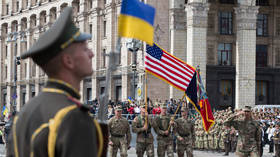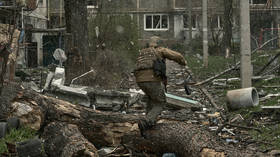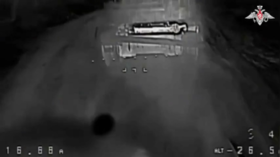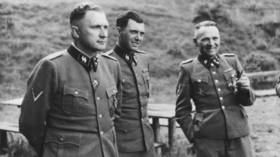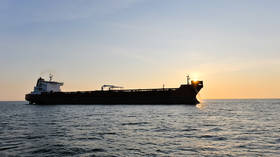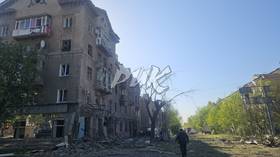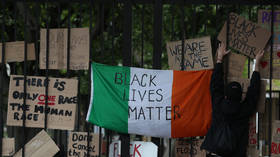NATO slowly imploding because it lacks a credible enemy: Serious people in Paris & Berlin know Russia isn’t a real threat
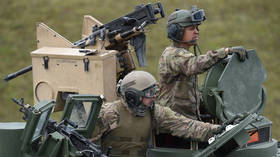
You know NATO’s in bother when even the Atlantic Council’s head honcho realizes the game is up. It’s now abundantly clear that the US’ main focus is switching to Asia, and Europe is becoming increasingly irrelevant to Washington.
The Atlantic Council’s worries are understandable. After all, the think tank saw its annual revenue rise from $2 million to $21 million between 2006 and 2016 on the back of NATO’s expansion into Eastern Europe. It’s most certainly raking in much more moolah now.
The main driver of the pressure group’s financial success was good timing. The US establishment had decided to reinstall Moscow as the “chief enemy” in the post-Osama and Saddam-era, and the pro-NATO outfit’s adroit anti-Russia messaging was useful. It also cultivated dozens of high-profile ‘fellows’ – united by their hostility to everything Russian – and it was quick to jump on the “disinformation” bandwagon. Indeed, it wound up providing censors to Facebook during the height of the “Trump-Russia” hoax.
But now the good times are over. China is the new bogeyman in Washington and Russia is becoming old news. The narrative has been exhausted.
The Democratic Party has flipped from mentioning Russia non-stop to barely talking about it at all. Meanwhile, Emmanuel Macron is trying to pull Moscow “back” into Europe, and Angela Merkel, the ‘Atlanticist’ German chancellor, has entered her lame-duck period.
New scarecrows
What’s more, even Eastern Europe isn’t united in believing Russia is the big bad wolf. The Polish president is more interested in picking fights with the LGBT community – he believes their ideology is “worse than communism” – and Hungary’s Viktor Orban said last Friday that his “government attributes special significance to relations with Russia.”
Clearly, NATO’s wheeze is running out of puff. At this point, the only people really invested in its success are its thousands of employees, and the arms industry. Of course, as the New York Times reported in 1998, the main driver of all that NATO expansion was to offer “[American] arms makers a new and hugely lucrative market.” Don’t weep for them, however, because China is a far juicier bad guy, from their financial perspective.
The Atlantic Council is fully aware and obviously fearful of what it means for its bottom line. We know this because its CEO and President Fred Kempe basically conceded the point in an op-ed published on Sunday. Kempe spoke of “transatlantic decoupling” and waffled on about “democracy, open markets, and individual rights.”
“The damage [of a decline of US influence] would be far-reaching for America’s worldwide interests, for European unity and influence, and for the most significant community of democracies and open-market economies the world has ever known,” Kempe wrote.
The old “NATO spreads democracy” canard is beyond parody at this point. Even “Freedom House,” a US government-funded ‘regime-change’ NGO, admits that five of NATO’s 30 members are not democracies: Albania, Hungary, Montenegro, Macedonia and Turkey. But fret not because anyone with half a brain knows NATO is about American geopolitical power projection, not ‘values.’
US government-funded @freedomhouse now admits *five* of NATO's 30 members are not democracies: Albania, Hungary, Montenegro, Macedonia & Turkey. A wake up call for those who seriously believe NATO is about 'freedom & democracy' rather than American geopolitical power projection. https://t.co/F4uRJb5wt3
— Bryan MacDonald (@27khv) May 7, 2020
End of the road
Kempe’s main assertion is about something called “NATO 2030,” designed to “ensure that, while the alliance remains militarily strong, it would become stronger politically and globally ensure its relevance in the face of a more assertive China and a global pandemic.” He adds that “without such efforts, NATO’s relevance could recede faster than its advocates understand.”
From reading the piece, one thing is abundantly clear: Kempe knows the game is up. Sadly, for the Atlantic Council, the gravy train is running out of track.
Here’s why: Nobody in Berlin, Rome, or Paris, who has any political influence, believes that Russia is a real threat. The British know it too, but their dependence on Washington means they can’t speak freely. The Hungarians are fully aware, as are the Italians, the Croatians, the Turks, the Greeks, and others. The only NATO members who have any remotely genuine concerns about Moscow are the three Baltic states – Estonia, Latvia, and Lithuania.
Given their current rate of depopulation, they have more pressing concerns than Russia to address. Lithuania, for example, has lost 24 percent of its population since 1991, down from 3.6 million to only 2.7 million. Those who have left include its brightest and best.
The reality is that Russia is not strong enough to be a major danger to the rest of Europe. It’s not the USSR, it doesn’t have a competing ideology, and it’s no longer in a position to conscript millions of men and send them to occupy other countries. Communism is long gone and many young Russian men today have mortgages, businesses, and car loans. They can’t leave them behind to go stand sentry in Prague for a few years.
Last year, total military spending by all 29 NATO member states was $1.035 trillion, while Russia spent $65 billion. That’s over 15 times less. China makes more sense as a peer competitor to the United States.
Dear @forbes, total military spending by all 29 NATO member states was $1.035 trillion in 2019. Russia spent $0.065 trillion. Which is FIFTEEN TIMES less. If Russia can beat NATO in two and a half days, NATO is clearly f**king useless & should be disbanded forthwith. pic.twitter.com/5bjXktjO0T
— Bryan MacDonald (@27khv) June 8, 2020
Russia versus NATO is far from a fair fight, but luckily they will never come to direct blows. Everyone, including Fred Kempe, know this. He’s fully aware that NATO exists to combat threats caused by its own existence and as long as NATO survives, Russia can’t be integrated into Europe’s security architecture – simply because NATO itself has no reason to continue without Russia as its enemy.
Also on rt.com WATCH Russian jets chase US nuclear-capable bombers away from country’s bordersThus, if Kempe really cares about Europe, rather than the Atlantic Council’s current accounts, he will privately cheer the US-led alliance’s slow descent into irrelevance.
Like this story? Share it with a friend!
The statements, views and opinions expressed in this column are solely those of the author and do not necessarily represent those of RT.
